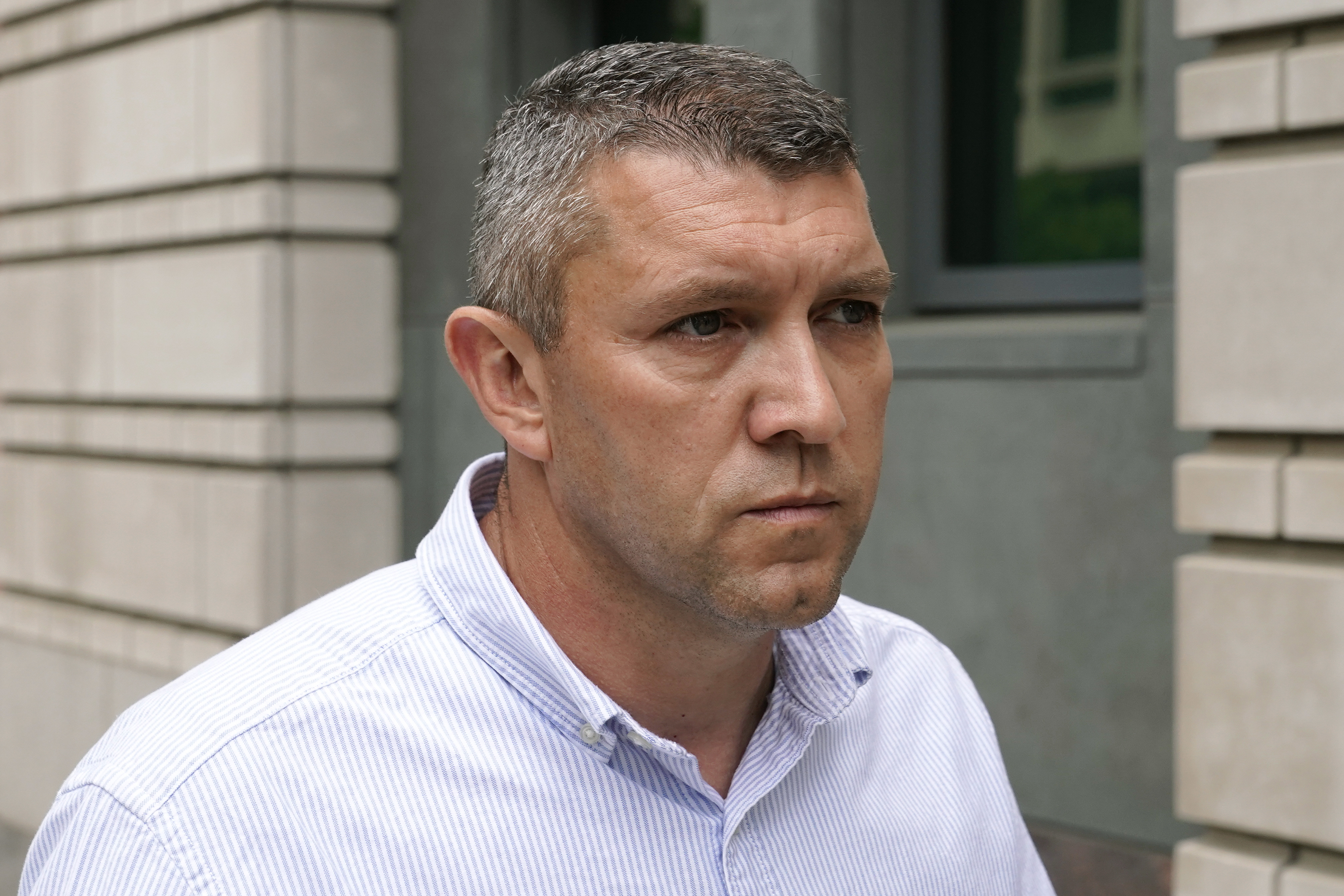Jesse L. Matthew Jr. pleaded guilty Wednesday in the deaths of two Virginia college students who vanished five years apart.
Matthew, 34, pleaded guilty to first-degree murder and abduction with intent to defile in the deaths of 18-year-old Hannah Graham and 20-year-old Morgan Harrington.
The plea agreement carries with it four consecutive life sentences, one for each charge. Matthew has agreed to waived any right to petition for any type of parole, appeal or geriatric release, Commonwealth's Attorney Robert N. Tracci said.
In accepting the plea agreement, the judge dropped the capital murder charge against Matthew in Graham's 2014 death. That charge had carried with it the possibility of the death penalty.
The victims' parents said they fully supported the plea agreement. In a press conference following the hearing, Graham's father, John Graham, said the agreement kept Hannah's friends and family from being retraumatized by a murder trial.
"The overriding priority was that that Matthew will never be able again to inflict his depravity on young women," John Graham said.
Local
Washington, D.C., Maryland and Virginia local news, events and information
"Today's events do not bring Hannah back to us, of course," he said. "We miss her every day and know that others do, too."
John Graham said Hannah loved Charlottesville and had been excited to return for her second year.
"At the time of her death, she was totally immersed in her courses, making plans, and looking forward to Nationals post-season baseball," he said. "We draw considerable pride in all that Hannah achieved in her short life, mercilessly cut short by Jesse Matthew. His evil deprived the world of a great talent, but Hannah's enduring gift to us all is that she enabled this wicked man to be apprehended and convicted. She did change the world, but at a terrible price."
Morgan Harrington's mother, Gil Harrington, said the plea agreement would let their family redirect their energy into healing and recovery.
"Both are areas that we have neglected during our quest for justice for Morgan," she said. "It has been a long, a very long journey to this point, and it has been a hard road...."
She thanked law enforcement, the media and the community for never giving up.
"For six and a half years, you all were determined and resolute to find the top-tier predator that hunted in this community," she said. "...They say it takes a village to raise a child. I know it takes one to bury a child. We are most grateful for the kindness and compassion you have lavished on our family."
Gil Harrington asked community members to continue to participate in their community, know their neighbors and look out for each other.
"Together, we can help save the next girl," she said.
Commonwealth's Attorney Robert N. Tracci said the state can re-indict Matthew with the capital charge should the terms of the plea agreement be violated.
"This agreement serves the interest of justice," Tracci said. "It ensures public safety and offender accountability.... "It serves the interest of justice by providing a joint resolution consistent with the wishes of the Graham and Harrington families that avoids the additional revictimization associated with highly public trials."
The judge also dropped a reckless driving charge against Matthew.
Through his attorney, Matthew said he was sorry and loves his family very much.
Matthew would have been tried separately in the killings of Graham, a student at the University of Virginia, and Harrington, a Virginia Tech student who disappeared after attending a concert on the U.Va. campus.
Witness Would Have Testified About Interaction With Woman Believed to Be Harrington
Hannah Elizabeth Graham and Morgan Dana Harrington were both young women in vulnerable straits when they vanished in Charlottesville, five years apart, authorities have said.
Harrington disappeared the night of Oct. 17, 2009, after she stepped out of the John Paul Jones Arena at U.Va. during a Metallica concert and was unable to get back in. She texted a friend shortly before 8:50 p.m. that she would "get a ride."
She was never heard from again. In January 2010, Harrington's remains would be found on Anchorage Farm in southern Albemarle County.
According to a statement of facts released by prosecutors Wednesday, Matthew was a cab driver at the time Harrington vanished. Four witnesses said that on Oct. 17, 2009, they took cab rides to the John Paul Jones Arena in a van that matched the description of Matthew's vehicle at the time. Their driver matched Matthew's description, the statement said.
Had the case gone to trial, one of the witnesses would have testified to seeing someone matching Harrington's description standing within feet of the cab as the witness got out. The witness remembered commenting to the young woman on her Pantera T-shirt.
That T-shirt was found about three weeks later. Police say DNA on the shirt matched DNA from the then-unsolved 2005 Fairfax sex assault. A forensic scientist later determined the same DNA was found on Matthew's belongings, the prosecutors' statement said.
Prosecutors also said a dog hair on the shirt had the same mitochondrial DNA haplotype as Matthew's dog, which occurs in only 13.3 percent of dogs in the U.S.
Investigators who analyzed Matthew's cellphone records say his phone showed "considerable activity" in the Charlottesville area in the hours before and after Harrington's disappearance, but about an hour and a of of "inactivity" at around 9:30 p.m.
The first cellphone activity after that hour and a half pinged a tower "consistent with the general direction" of the farm where Harrington's remains would be found, the prosecutors' statement said.
Women Say Matthew Acted Inappropriately in Bars the Night Graham Disappeared
On the night of Sept. 12, 2014, Graham had dinner and attended off-campus parties with friends, but left by herself. In the early-morning hours of Sept. 13, 2014, she was captured on surveillance video walking unsteadily, and sometimes running, past a service station and a restaurant. She texted a friend that she was lost.
According to the statement of facts in the case, Matthew visited several local bars that night and "began a pattern of physically invasive and inappropriate behavior toward women."
Several women later told investigators that Matthew made them feel uncomfortable and made unwanted advances toward them.
Surveillance video showed Graham crossing Charlottesville's downtown pedestrian mall, then leaving a restaurant with Matthew, his arm wrapped around her.
A witness later told authorities that Matthew "did not look friendly" and that Graham had stopped at Matthew's orange Chrysler Sebring as Matthew unlocked the passenger door. The witness heard Graham say she wasn't getting in the car with him, and that Graham sounded frightened.
Authorities said they were unable to track Matthew's movements via cellphone during that time because the phone was likely in airplane mode.
Graham's disappearance, which came at a time of rising national concern about sexual assaults and other crimes on college campuses, prompted a massive search. Her body was found five weeks later on abandoned property in Albemarle County, about 12 miles from the U.Va. campus and six miles from where Harrington's remains were found.
Had the case gone to trial, a botany expert would have testified that plant material recovered from the chassis of Matthew's vehicle was consistent with the plant life where Graham's remains were found.
Witnesses would have testified that in the days after Graham's disappearance, Matthew acted strangely, saying that he was "not okay," reporting to work late and not acknowledging coworkers. Others would have testified that Matthew had a swollen jaw and rarely left his apartment, prosecutors said.
Previous Accusations; Conviction in 2005 Attempted Murder
After police named Matthew a person of interest in Graham's disappearance, he fled and was later apprehended on a beach in southeast Texas. He was charged with abduction with intent to defile, a felony that empowered police to swab his cheek for a DNA sample. That sample connected Matthew to the 2005 sexual assault in Fairfax, Virginia, according to authorities.
Matthew was charged in that case and went to trial last year. During the trial, the victim testified that she was sure she was going to die during the attack. Her assailant ran off when a bystander approached the wooded area where she had been dragged and assaulted.
Matthew ultimately took an Alford plea in that case. An Alford plea is not an admission of guilt, but an acknowledgment that there was enough evidence to convict.
The DNA evidence in the Fairfax attack, in turn, linked Matthew to the Harrington case, authorities have said.
Matthew also had been accused of raping students in 2002 and 2003 at Liberty University and Christopher Newport University, where he had played football.
Those cases were dropped when the women declined to press charges.



